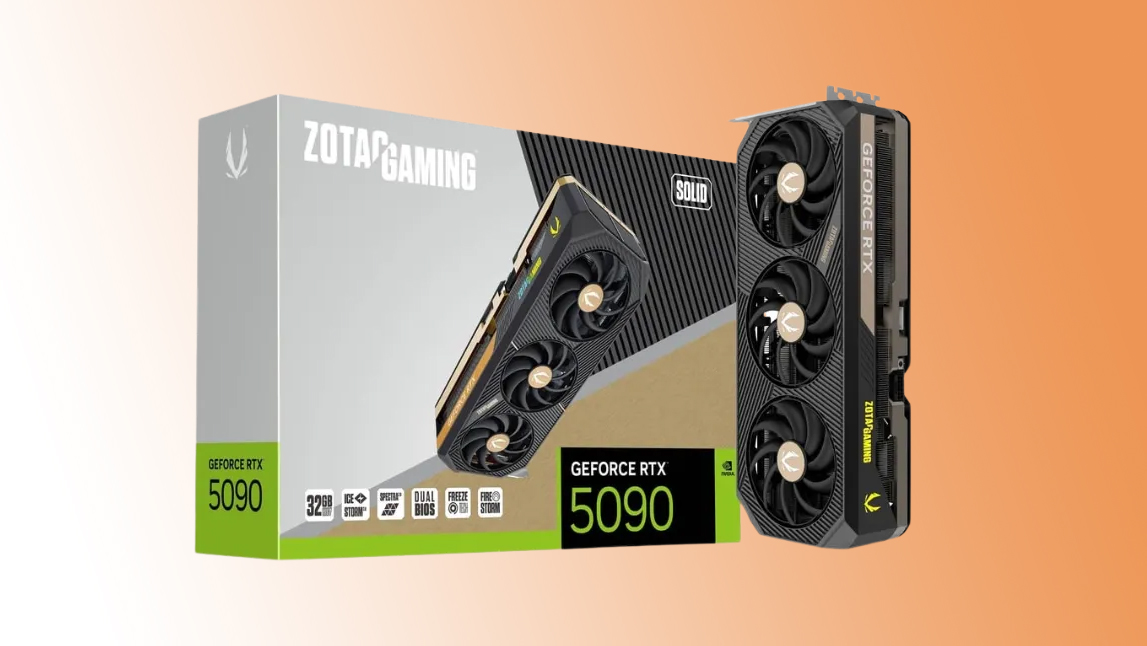Retailer clarifies RTX 5090 'B-stock' listing with missing ROPs was a system error
The GPU was sourced from a customer return and was never intended for sale.

German tech retailer Alternate has explained a controversial recent listing on its website for an RTX 5090 with missing ROPs. On the site it was classified as "B-stock" that, despite the apparent defect, was being sold for more than the graphic card model's MSRP. The online store confirmed has now that this GPU was part of a customer return and was never intended for sale (via ComputerBase).
The first case of an RTX 50 series GPU with missing ROP units dates back to late February, with many subsequent reports to follow as awareness increased. ROPs are hardware units on your GPU responsible for pixel processing, blending, anti-aliasing, and writing to the frame buffer. All displayed pixel data must go through the ROP units before it can be written to the GPU's memory.
Nvidia later issued a clarification asserting only 0.5% of produced RTX 5090s and RTX 5070 Tis were impacted, asking affected customers to push their respective board partners for a replacement. After it was revealed that this manufacturing defect extended to the RTX 5080 as well, testing by Gamer's Nexus showed that GPUs with a missing ROP cluster take an up to 11% performance hit while gaming.
Considering the broad Blackwell shortage, retailers selling defective units with missing ROPs at a discount wouldn't be surprising. Last week, Alternate listed a "B-stock" RTX 5090 with 168 (out of 176 advertised) ROPs for €2,899 ($3,100), a price that's comparable to fully functional models. After the news emerged, the German store contacted ComputerBase, explaining that the listed GPU was the consequence of an internal system error and was never intended to be sold.

B-stock typically refers to products that are no longer considered new due to issues like cosmetic flaws or customer returns. Based on the extent of these issues, retailers then establish a reasonable price tag for these items. The defective RTX 5090 at Alternative was likely misclassified as B-stock in their database due to a part defect: the missing ROP units. Moreover, the system defaulted to the cost of a brand-new RTX 5090, as it was probably not designed to price GPUs with missing ROPs in the first place.
“We have of course removed the said graphics card from the sale... Some internal processes run automatically where errors can happen.”
Alternate to ComputerBase
The GPU has now been delisted from the website, and it was apparently a customer return, likely intended for replacement. Blackwell supply is gradually improving but the same cannot be said for the prices.
Even though street prices barely adhere to the MSRP, AIBs are continuing to increase them as we move into April. The average selling price of an RTX 5090 Founders Edition at eBay has stabilized at $4,000 but we're still likely months away from normality. Sadly, this trend continues to plague both current-gen and last-gen GPUs, not just from Nvidia, but from all three vendors.
Get Tom's Hardware's best news and in-depth reviews, straight to your inbox.

Hassam Nasir is a die-hard hardware enthusiast with years of experience as a tech editor and writer, focusing on detailed CPU comparisons and general hardware news. When he’s not working, you’ll find him bending tubes for his ever-evolving custom water-loop gaming rig or benchmarking the latest CPUs and GPUs just for fun.
-
monkey_biz Does anybody really believe that? Someone entered it into the system and even specified the ROPs.Reply
If it walks like a duck… they were trying it out, were surprised at the backlash and now find excuses. -
Alvar "Miles" Udell It makes sense to sell them since it was disclosed and at a slight discount, as mentioned in earlier articles the missing ROPs don't affect all workloads so they could have easily been for those.Reply -
helper800 Reply
Yeah, I believe it. It was returned and entered into their stock system and probably forgotten to be flagged as RMA, so instead, the card showed up as damaged product for sale. If they were actually selling it, 5 seconds after they put it up for sale, it would have been gone, and nobody would have even known that this happened. I would bet that you couldn't check out with it in checkout, and even if you could the order would have been canceled.monkey_biz said:Does anybody really believe that? Someone entered it into the system and even specified the ROPs.
If it walks like a duck… they were trying it out, were surprised at the backlash and now find excuses. -
jlake3 Reply
I worked as a cashier for a while at a retailer that sold returns as open-box specials, and… yeah. It’s definitely possible.monkey_biz said:Does anybody really believe that? Someone entered it into the system and even specified the ROPs.
If it walks like a duck… they were trying it out, were surprised at the backlash and now find excuses.
When processing a return, the system first asked if the item had been opened. If no, it was added back to standard inventory. If yes, I believe we were then prompted whether on if it was defective, at which point it became a “Return to Vendor”. If it wasn’t, then we were prompted to either mark it as “Complete” or add a note as to condition and missing packaging or accessories. It then automatically generated an open-box sticker and added it to the system.
If someone said “No” to the defect question either in error or because they just work there and don’t understand GPU internals, then typed in the comment about ROPs the customer gave them, this is EXACTLY what the system would do. -
Notton Reply
Hanlon's Razor.monkey_biz said:Does anybody really believe that? Someone entered it into the system and even specified the ROPs.
If it walks like a duck… they were trying it out, were surprised at the backlash and now find excuses.
Never attribute to malice that which is adequately explained by stupidity/incompetence.
Not everyone working at a PC retail store cares, it's just a job after all. -
husker Reply
So that would be a human error, blaming the system.jlake3 said:I worked as a cashier for a while at a retailer that sold returns as open-box specials, and… yeah. It’s definitely possible.
When processing a return, the system first asked if the item had been opened. If no, it was added back to standard inventory. If yes, I believe we were then prompted whether on if it was defective, at which point it became a “Return to Vendor”. If it wasn’t, then we were prompted to either mark it as “Complete” or add a note as to condition and missing packaging or accessories. It then automatically generated an open-box sticker and added it to the system.
If someone said “No” to the defect question either in error or because they just work there and don’t understand GPU internals, then typed in the comment about ROPs the customer gave them, this is EXACTLY what the system would do. -
helper800 Reply
I would even argue Occam's Razor in this instance.Notton said:Hanlon's Razor.
Never attribute to malice that which is adequately explained by stupidity/incompetence.
Not everyone working at a PC retail store cares, it's just a job after all. -
abufrejoval Now isn't that kind of fun, having the next door favorite retailer getting international attention?Reply
Oh, darn, it seems it's all about bad news, which somehow seems to travel faster than good...
Quite honestly, Alternate has always been a straight shooter, fast and reliable. Been with them for what must be close to three decades now.
I sure hope that's not changing any time soon, especially not with the new trade wars launched around April fool's day!